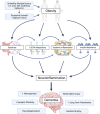Pathophysiological Links Between Obesity and Dementia
- PMID: 37086380
- PMCID: PMC10721659
- DOI: 10.1007/s12017-023-08746-1
Pathophysiological Links Between Obesity and Dementia
Abstract
Obesity is a major global health concern, with prevalence rates rapidly rising due to increased availability of highly processed foods rich in fats and/or sugars and technological advances promoting more sedentary behaviour. There is increasing evidence to suggest that obesity predisposes individuals to developing cognitive impairment and dementia. However, the relationship between the brain and the peripheral metabolic state is complex, and many of the underlying mechanisms of cognitive impairment in obesity are yet to be fully elucidated. To better understand the links between obesity and dementia, further work is required to determine pathological changes occurring in the brain during obesity. In this mini-review, we discuss the role of two pathological features of obesity (the gut-brain axis and systemic inflammation) and their potential contribution to dementia.
Keywords: Cognitive function; Dementia; Gut-brain axis; Inflammation; Obesity.
© 2023. The Author(s).
Conflict of interest statement
The authors have no conflict of interest/competing interests to declare.
Figures

References
-
- Christiansen CB, Gabe MBN, Svendsen B, Dragsted LO, Rosenkilde MM, Holst JJ. The impact of short-chain fatty acids on GLP-1 and PYY secretion from the isolated perfused rat colon. American Journal of Physiology-Gastrointestinal and Liver Physiology. 2018;315(1):G53–G65. doi: 10.1152/ajpgi.00346.2017. - DOI - PubMed
Publication types
MeSH terms
LinkOut - more resources
Full Text Sources
Medical

